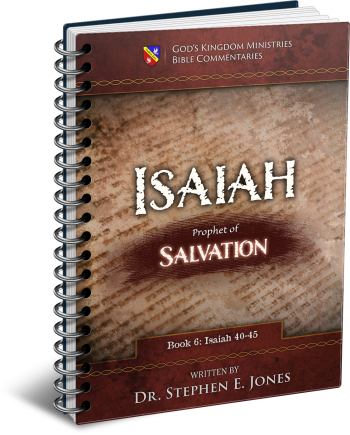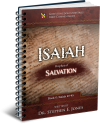Latest Posts
View the latest posts in an easy-to-read list format, with filtering options.

Isaiah is the prophet of Salvation. He is also known as the truly "Universalist" prophet, by which is meant that He makes it clear that salvation is extended equally to all nations and not just to Israel. He lived to see the fall of Israel and the deportation of the Israelites to Assyria, and he prophesied of their "return" to God (through repentance). He is truly a "major prophet" whose prophecies greatly influenced the Apostle Paul in the New Testament.
Category - Bible Commentaries

Isaiah 43:14, 15 begins a new prophecy about Babylon, saying,
14 Thus says the Lord your Redeemer, the Holy One of Israel, “For your sake I have sent to Babylon and will bring them all down as fugitives [bariyach, “fleeing”], even the Chaldeans, into the ships in which they rejoice. 15 I am the Lord, your Holy One, the Creator of Israel, your King.”
Isaiah speaks here of the downfall of Babylon even before the rise of the Babylonian empire. The prophet had already foretold the Babylonian captivity of Judah (Isaiah 39:6, 7). Yet in Isaiah 43:14 it is unclear if he was talking about the captivity of Judah or Israel.
The prophecy in Isaiah 43 does not mention Judah specifically. In fact, it comes in the context of prophecies to Israel. This suggests that the prophecy was to be applied to end-time Mystery Babylon, rather than to the captivity of Judah under Nebuchadnezzar.
For clarity, then, we must turn to other passages and to other prophets, where Babylon is more than a city or even an empire. As time passes, prophecy focuses on two opposing cities, two systems of government, two cultures, and two ways of life. The first is Babylon, built by Nimrod; the second is Jerusalem, built by Shem. In the book of Revelation John speaks of their successors, spiritual cities called Mystery Babylon and New Jerusalem.
While many commentators assume that Isaiah 43:14 was speaking of the overthrow of the old city of Babylon and the end of Judah’s captivity, I see this primarily in its broader context. God gave the Dominion Mandate to Nebuchadnezzar, king of Babylon, and when the city of Babylon fell 70 years later in 537 B.C., its heir was Persia.
The Dominion Mandate was passed down much like a father passes down his possessions, authority, and even his name to his son.
Babylon and its successors were to rule all nations, including the Israelites who had been taken to Assyria. So Isaiah prophesies of the downfall of Babylon and pictures the Babylonians fleeing in ships that sailed up and down the Euphrates River.
Isaiah 43:16-19 says,
16 Thus says the Lord, who makes a way through the sea and a path through the mighty waters, 17 who brings forth the chariot and the horse, the army and the mighty man (They will lie down together and not rise again; they have been quenched and extinguished like a wick): 18 “Do not call to mind the former things or ponder things of the past. 19 Behold, I will do something new, now it will spring forth; will you not be aware of it? I will even make a roadway in the wilderness, rivers in the desert.”
Verses 16 and 17 give us a lengthy introduction to God Himself. He reminds the people of the former manner of delivering Israel from Egypt, how He made a way through the Red Sea to escape from the chariots of Egypt. He reminds them how the Egyptian army, with its horses and chariots perished in the Red Sea and how they were “quenched and extinguished like a wick.”
But God tells the people not to look back at the past. Although the past has provided us with a general pattern and precedent, God was to do a new thing. So we must not be too reliant on past history. Israel was no longer to go to Egypt, nor would the waters of the Red Sea again part to make a path for them to escape. The escape from Babylon was to be done in a new way, because the future Babylon was a spiritual city ruling the world as the great harlot. The new situation would require a new strategy.
Isaiah 43:20, 21 continues,
20 “The beasts of the field will glorify Me, the jackals and the ostriches, because I have given waters in the wilderness and rivers in the desert, to give drink to My chosen people. 21 The people whom I formed for Myself will declare My praise.”
While some try to force this prophecy to speak of Judah’s return from Babylon as they would cross the Syrian desert, there is no evidence from history that God provided literal rivers and pools for them to drink water during their journey. Neither is there any record of a spiritual revival taking place as they journeyed to the old land. The only revival on record took place later, long after their arrival in Jerusalem, when the people kept the Feast of Tabernacles (Booths) in Neh. 8:13-18.
That revival, in fact, established the prophetic precedent for the great outpouring of the Holy Spirit in our own time when the people finally discover the law of God and begin to understand its meaning. The timing of this revival is associated in some way with the Feast of Tabernacles in particular and, in general, the Age of Tabernacles.
Isaiah’s prophecy metaphorically includes the people of all nations, picturing them as inhabitants of the wilderness—that is, unbelievers dwelling outside the Kingdom. The “beasts of the field,” the “jackals” and “ostriches” will then glorify God, because they too will drink the water of the former and latter rains. So Joel 2:28 prophesies, “I will pour out My Spirit on all mankind.”
The “new” manner of deliverance must also be viewed in terms of the “New Jerusalem,” as well as the “new heaven and a new earth” (Rev. 21:1, 2). We read in Rev. 21:5,
5 And He who sits on the throne said, “Behold, I am making all things new…”
Revelation 22:17 adds,
17 The Spirit and the bride say, “Come.” And let the one who hears say, “Come.” And let the one who is thirsty come; let the one who wishes take the water of life without cost.
Those who are thirsty from all nations are thus invited to drink of the water of life that flows from the throne of God (Rev. 22:1). Isaiah 43:20, 21 says that this “water” was given to “My chosen people,” but everyone else benefits as well. Because Paul limits the “chosen” ones to the remnant of grace (Rom. 11:7), we should know that the promise has been given to the overcomers.
In other words, the overcoming remnant will do the preparation work necessary to bring about the release from Babylon and to bring the blessings of Abraham to all nations through the outpouring of the Holy Spirit. This becomes clear in the next section of Isaiah 43.
Isaiah 43:22-24 says,
22 “Yet you have not called on Me, O Jacob; but you have become weary of Me, O Israel. 23 You have not brought to Me the sheep of your burnt offerings, nor have you honored Me with your sacrifices. I have not burdened you with offerings, nor wearied you with incense. 24 You have bought Me not sweet cane with money, nor have you filled Me with the fat of your sacrifices; rather you have burdened Me with your sins, you have wearied Me with your iniquities.”
This is much like the situation in the days of Elijah, when the prophet complained that Israel as a whole refused to follow God. God then told him that He had reserved 7,000 for Himself. This group was the remnant of grace, who, as Paul says, were actually “chosen” (Rom. 11:7). The other Israelites who worshiped false gods were NOT “My chosen people” (Isaiah 43:20), regardless of their genealogy.
Isaiah’s words come in the context of Old Covenant worship, which has now changed, but the principle is the same. The requirement of sacrifice remains, but since the day Jesus died on the cross, we are now required to present Him as our Sacrifice. Anything else is insufficient. Anyone who presents an animal sacrifice, regardless of his sincerity, falls into the same category of the faithless people in the days of Elijah and Isaiah who were NOT chosen.
One must have faith in the Mediator of the New Covenant to qualify as a “chosen” one.
Isaiah 43:25 says,
25 “I, even I, am the One who wipes out your transgressions for My own sake.”
This is a reminder of the New Covenant, which is based on the promise of God alone. Therefore, God alone is the One who is going to accomplish this great salvation. Those who depend upon their own decisions to be saved will fail in the end, for their decisions are based on the Old Covenant vows of men. Hence also, they bring themselves (i.e., their own will) as their “sacrifice” to God. In other words, they themselves are another form of animal sacrifice, which, along with other sheep, bulls, and goats, can never remove sin.
Isaiah 43:26-28 says,
26 “Put Me in remembrance, let us argue our case together; state your cause, that you may be proved right. 27 Your first forefather sinned, and your spokesmen have transgressed against Me. 28 So I will pollute the princes of the sanctuary, and I will consign Jacob to the ban and Israel to revilement.”
The court case being argued here appears to be the one that was begun in Isaiah 41:21, complete with the opportunity to present witnesses (Isaiah 43:10). The bottom line, the prophet says, is that “your first forefather sinned,” and this was repeated in every generation after Adam. In Paul’s writings, we find that the “old man,” the natural man that was born of Adam, cannot comprehend the things of God and cannot be perfected.
Even “the princes of the sanctuary,” the elders among the priests, were polluted and were not truly qualified to make an acceptable sacrifice to God on behalf of the people. God took the credit for it, saying, “I will pollute” them, because Adam’s sin was imputed to all, which polluted everyone, including the priests.
So Jacob-Israel was put under the curse, or “ban” (cherem). This is a reference to the curse upon mankind (and all of creation) for Adam’s sin. Fortunately, as Paul explains thoroughly, God has provided us with the path to salvation through Christ. He has shown the way to be begotten by God and to change our identity to the new creation that is a son of God.
This is the New Covenant path to salvation, which the apostle seems to have found in the writings of Isaiah, the Prophet of Salvation.